Key Takeaways:
- Bariatric surgery has the potential to dramatically improve PCOS symptoms by improving insulin resistance and reducing androgen levels.
- Many women experience regular menstrual cycles after bariatric surgery and improved fertility.
It can be frustrating when you’re suffering from both PCOS and excess weight. The two conditions often feed into each other, creating a tough cycle to break with diet and exercise alone. That’s why many females are turning to bariatric surgery as a potential solution for both issues. But does it really help with PCOS?
In this article, we’ll look into how bariatric surgery and PCOS are more closely linked than you might think.
Table of Contents
Understanding PCOS and Its Challenges
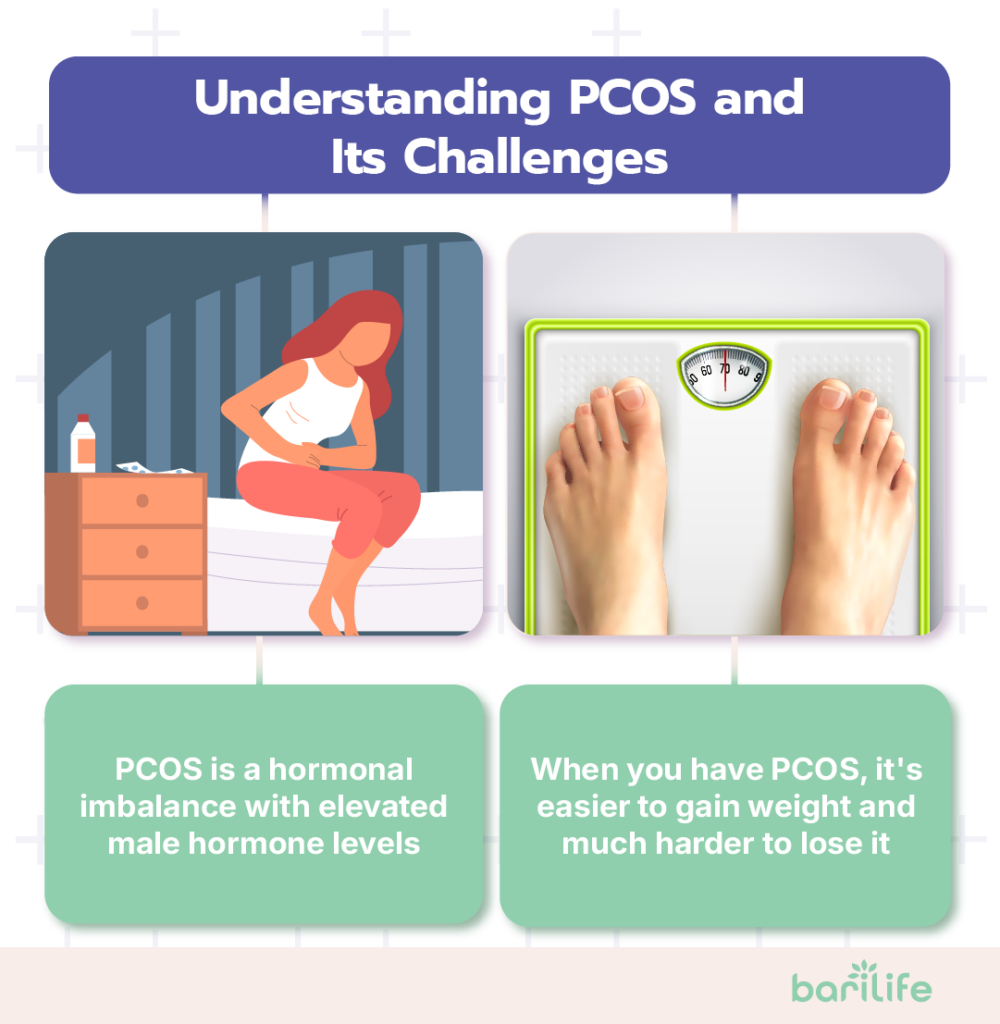
Before talking about surgery, let’s break down what PCOS actually is and why it can be so difficult to manage.
What’s Going On With Your Hormones
Polycystic Ovary Syndrome (PCOS) is incredibly common, affecting about 1 in 10 women of childbearing age. At its core, PCOS is a hormonal imbalance where the body is producing higher levels of male hormones (androgens) than it should, which throws several systems out of balance.
This can cause some frustrating symptoms, including:
- Irregular periods or no periods at all
- Excess hair growth on areas like the face, chest, or back
- Acne that won’t clear up
- Thinning hair on the scalp
- Small cysts on the ovaries
Your hormones are a delicate ecosystem—when one thing is out of balance, it affects everything else.
The Weight and Metabolism Connection
When you have PCOS, it’s easier to gain weight and much harder to lose it. Some studies suggest more than 80% of females with PCOS struggle with weight issues. The reason for this is:
- Insulin resistance: Many females with PCOS have cells that don’t respond properly to insulin. The body then produces more insulin, which triggers the ovaries to make more androgens and makes it easier to store fat.
- Increased hunger: Hormone imbalances can affect appetite regulation, making you feel hungry more often.
- Slower metabolism: Some studies suggest females with PCOS burn fewer calories during rest and exercise compared to females without PCOS.
The Fertility Factor
For many females, the most distressing aspect of PCOS is difficulty getting pregnant. When your hormones are out of balance, you might not ovulate regularly—or at all. Without ovulation, pregnancy can’t happen.
The irregular cycles and missed periods common with PCOS are often signs that ovulation isn’t occurring. This makes PCOS one of the most common causes of infertility, affecting millions of females worldwide.
Who Should Consider Bariatric Surgery for PCOS?
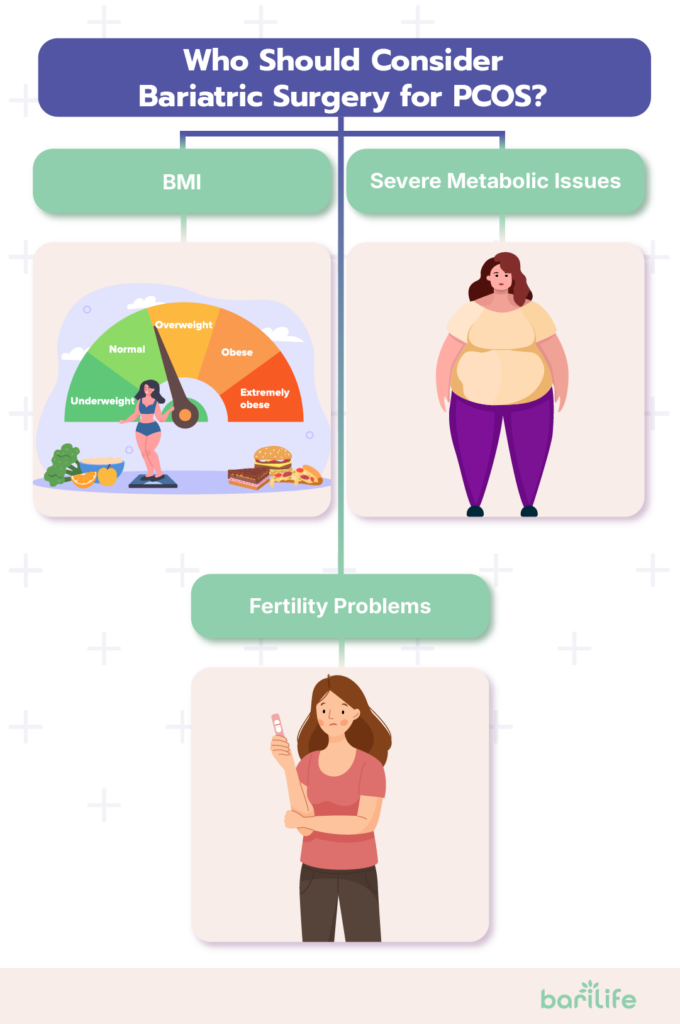
Bariatric surgery is not for everyone with PCOS. So, how do you know if it’s a good option for you?
Weight As a Significant Factor
Bariatric surgery for PCOS is considered an option when:
- Your BMI is 40 or higher, or
- Your BMI is 35-40, and you have issues related to weight, like high blood pressure, diabetes, sleep apnea, or severe joint pain, or
- Your BMI is 30-35 with uncontrolled type 2 diabetes
Additionally, you’ve likely tried multiple supervised diet and exercise programs without success.
Severe Metabolic Issues
Bariatric surgery and PCOS treatment go hand-in-hand when metabolic problems are significant. You might be a good candidate if:
- You have insulin resistance that isn’t well-controlled with medication
- You’ve developed type 2 diabetes related to your PCOS
- You have metabolic syndrome
- Your PCOS symptoms are severe and significantly affect your quality of life
If not addressed, these metabolic issues can develop into serious long-term health complications.
Fertility Problems
For females hoping to get pregnant, the fertility aspects of PCOS can be heartbreaking. Bariatric surgery might be worth considering if:
- You’ve been unable to conceive due to a lack of ovulation
- Fertility treatments haven’t been successful because of your weight or metabolic issues
- You’re younger and want to improve your reproductive health for future pregnancy plans
It’s important to note that doctors typically recommend waiting 12-18 months after bariatric surgery before trying to conceive. This allows your weight to stabilize and reduces the risk of nutritional deficiencies that could affect a pregnancy.
Bariatric Surgery as a Treatment for PCOS
So, what can bariatric surgery do for your PCOS symptoms? The results are sometimes life-changing.
How Surgery Changes Your Hormones
When you lose significant weight after bariatric surgery, your hormone levels often return to normal patterns. Specifically:
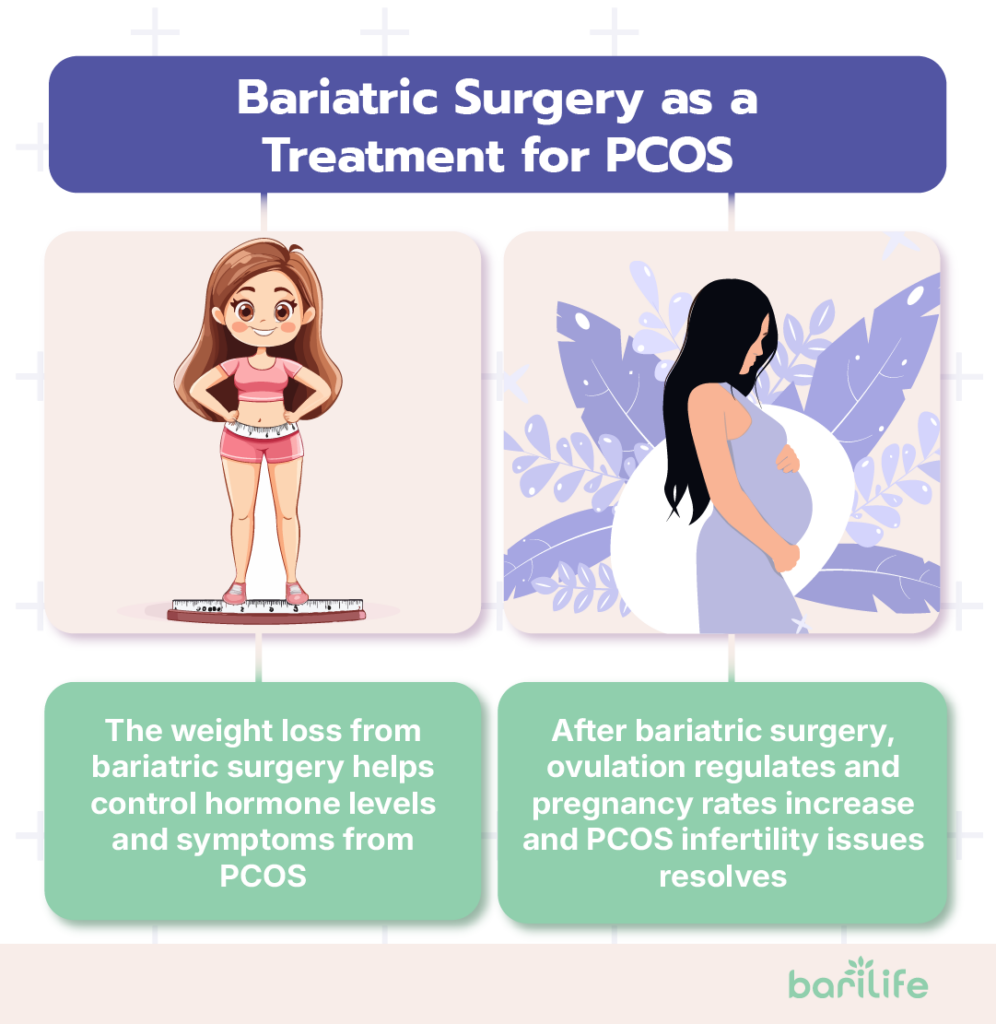
- Testosterone and other androgen levels typically decrease
- Sex hormone binding globulin (SHBG) increases, which helps control free testosterone in your bloodstream
- Insulin levels drop, which helps reduce the chain reaction that leads to excess androgen production
These hormonal improvements often begin surprisingly quickly—sometimes within weeks of surgery, even before you’ve lost a significant amount of weight. This suggests that changes in gut hormones after surgery may play a role beyond just weight loss.
Relief From Frustrating Symptoms
For many women, PCOS bariatric surgery leads to significant improvements in symptoms:
- Menstrual cycles often become more regular or return to normal
- Excess hair growth may slow or decrease
- Acne frequently improves
- Scalp hair loss often stabilizes or reverses
Additionally, bariatric surgery and diabetes show a compelling connection. For women with PCOS and type 2 diabetes, surgery not only helps with hormone regulation but also addresses insulin resistance directly. This is especially promising for those wondering, “does bariatric surgery cure diabetes?” In many cases, it leads to remission.
Metabolic Health Transformation
The metabolic benefits of bariatric surgery for PCOS patients can be transforming:
- Insulin resistance improves dramatically, often resolving completely
- Type 2 diabetes goes into remission in 60-80% of cases
- Blood pressure typically decreases to healthier levels
- Cholesterol profiles improve
- Inflammation decreases throughout the body
These metabolic improvements reduce your risk of serious health complications later in life and help you feel better day-to-day with more energy and fewer symptoms. And these outcomes are particularly relevant for those exploring bariatric surgery for hypertension and bariatric surgery and gallbladder issues, both of which are common comorbidities with PCOS.
The Fertility Effect
Perhaps the most emotionally significant change for many females is improved fertility. Studies show that:
- Regular ovulation often returns within 6-12 months after surgery
- Pregnancy rates increase significantly compared to before surgery
- PCOS-related infertility issues resolve for many women
While bariatric surgery is never performed solely for fertility reasons, this “side effect” can be life-changing for females who’ve struggled to conceive due to PCOS.
Scientific Evidence & Studies
Bariatric surgery has been shown to significantly improve symptoms of polycystic ovary syndrome (PCOS). Clinical studies have documented notable reductions in PCOS prevalence and improvements in reproductive health following weight-loss surgery.
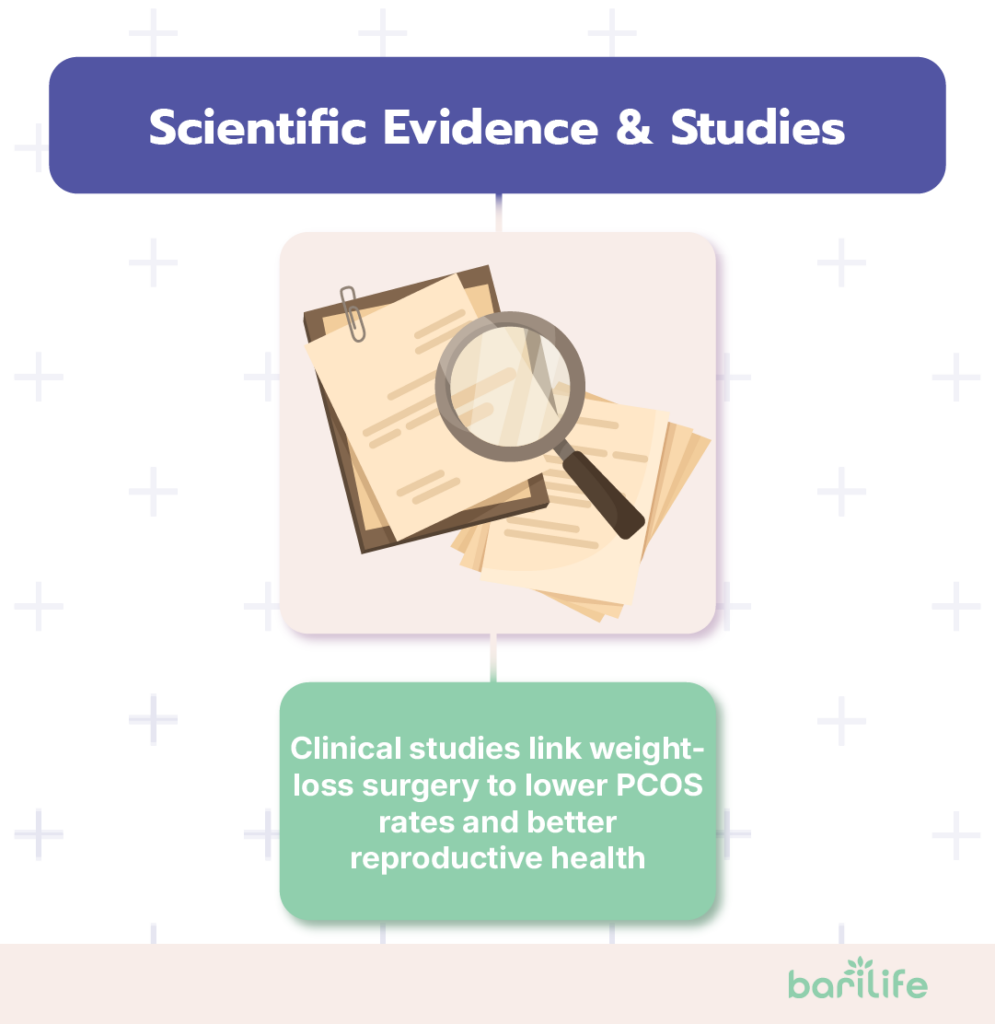
- A 2022 study involving 2,130 patients found that the prevalence of PCOS decreased from 45.6% before surgery to 6.8% after bariatric surgery, stabilizing at 7.1% one year post-operation.
- A 2023 study reported that 66% of women with PCOS experienced improved menstrual regularity, and 74% showed sonographic improvement of PCOS features one year after bariatric surgery.
- A 2008 report by the Agency for Healthcare Research and Quality noted that 89% of women with irregular menses resumed regular menstrual cycles following bariatric surgery.
Long-Term Success Rates
Studies on the long-term effects of bariatric surgery on PCOS are limited. However, plenty of research suggests bariatric surgery has lasting effects on metabolic and hormonal profiles. These lasting effects are based upon maintaining weight loss and adhering to postoperative care.
- A 2022 review highlighted that testosterone levels declined significantly at 6 and 12 months post-Roux-en-Y gastric bypass, along with reductions in hirsutism and menstrual irregularities.
- A 2023 study emphasized the importance of continuous follow-up within a multidisciplinary treatment team to ensure patient compliance and maximize the long-term benefits of bariatric surgery.
- A 2017 observational study by the National Institute of Diabetes and Digestive and Kidney Diseases (NIDDK) found that weight loss from Roux-en-Y gastric bypass was associated with improvements and prevention of type 2 diabetes and obesity-related cardiovascular conditions over a 12-year period.
Which Surgery Works Best?
If you’re wondering which bariatric surgery is best for PCOS, the answer isn’t entirely straightforward. The most common procedures are:
- Gastric sleeve (sleeve gastrectomy): Removes about 80% of the stomach
- Gastric bypass (Roux-en-Y): Makes a small stomach pouch and reroutes part of the digestive tract
- Adjustable gastric band: Places an adjustable band around the upper portion of the stomach
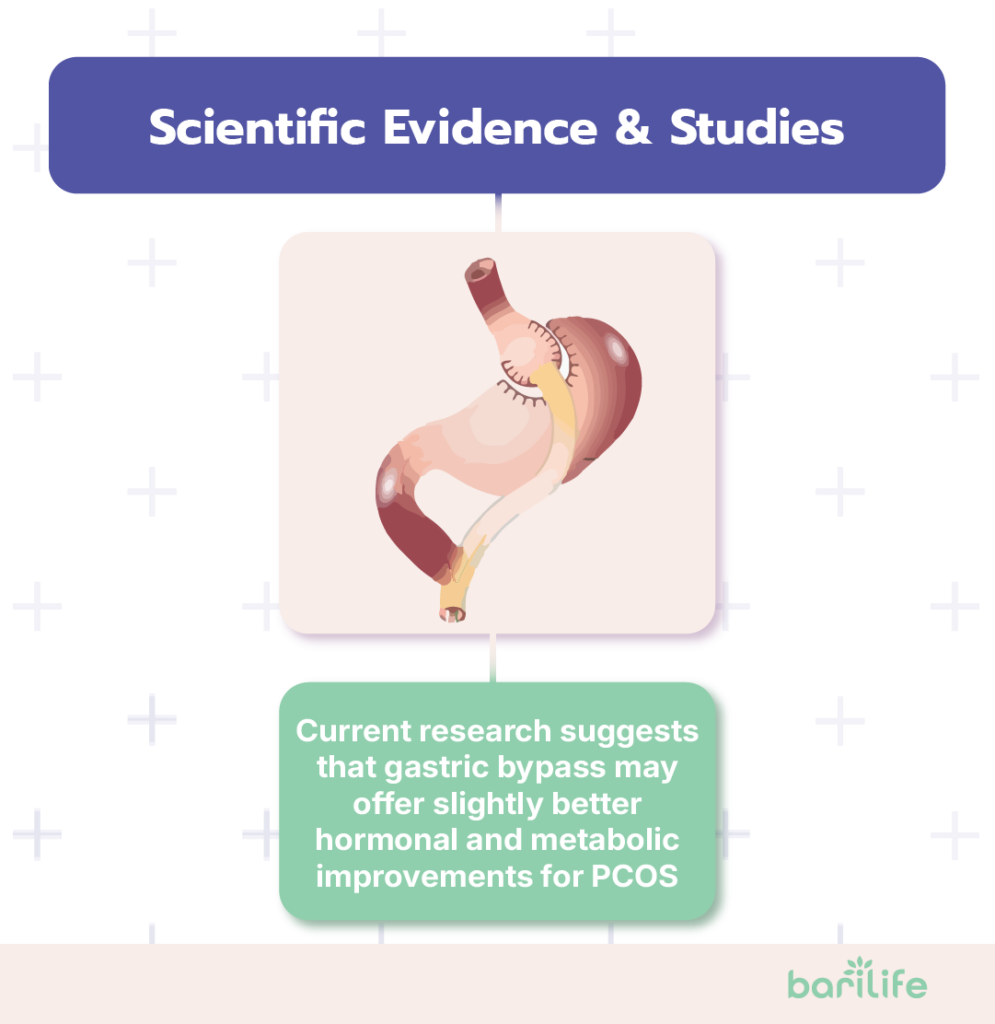
Current research suggests that gastric bypass may offer slightly better hormonal and metabolic improvements for PCOS patients compared to other procedures. However, the best bariatric surgery for PCOS depends on your unique health situation, weight, and other factors that you need to discuss with your healthcare provider.
Risks and Considerations of Bariatric Surgery for PCOS Patients
While the benefits can be significant, bariatric surgery is still a major procedure with important considerations.
Surgical Risks to Consider
Like any surgery, bariatric procedures come with potential complications, including:
- Infection at incision sites
- Bleeding
- Blood clots
- Adverse reactions to anesthesia
- Leaks in your digestive system
- Bowel obstruction
- Need for follow-up procedures
The good news is that bariatric surgery has become much safer over the years. Still, it’s important to be aware of these risks when making your decision.
Nutritional Challenges
After surgery, your body won’t absorb nutrients the same way. This means:
- You’ll need to take vitamin and mineral supplements for life
- Regular blood tests are vital for checking deficiencies
- You’ll need to be mindful about getting enough protein
- Pregnancy after surgery requires extra careful nutritional monitoring
For PCOS patients, maintaining adequate levels of vitamin D, B vitamins, iron, and calcium is very important, as lack of these nutrients can potentially worsen hormone imbalances.
Lifestyle Changes
Bariatric surgery isn’t a magic fix—it requires permanent lifestyle changes, including:
- Eating much smaller portions
- Chewing food thoroughly
- Avoiding sugary and high-fat foods
- Taking supplements consistently
- Regular exercise
- Ongoing medical follow-up
These changes can be challenging, but are essential for long-term success. Many women find that the improvements in their PCOS symptoms provide strong motivation to maintain these habits.
Emotional and Psychological Impact
Dramatic weight loss can also have a psychological impact:
- Your body image will change significantly
- Relationships may be affected as people respond differently to you
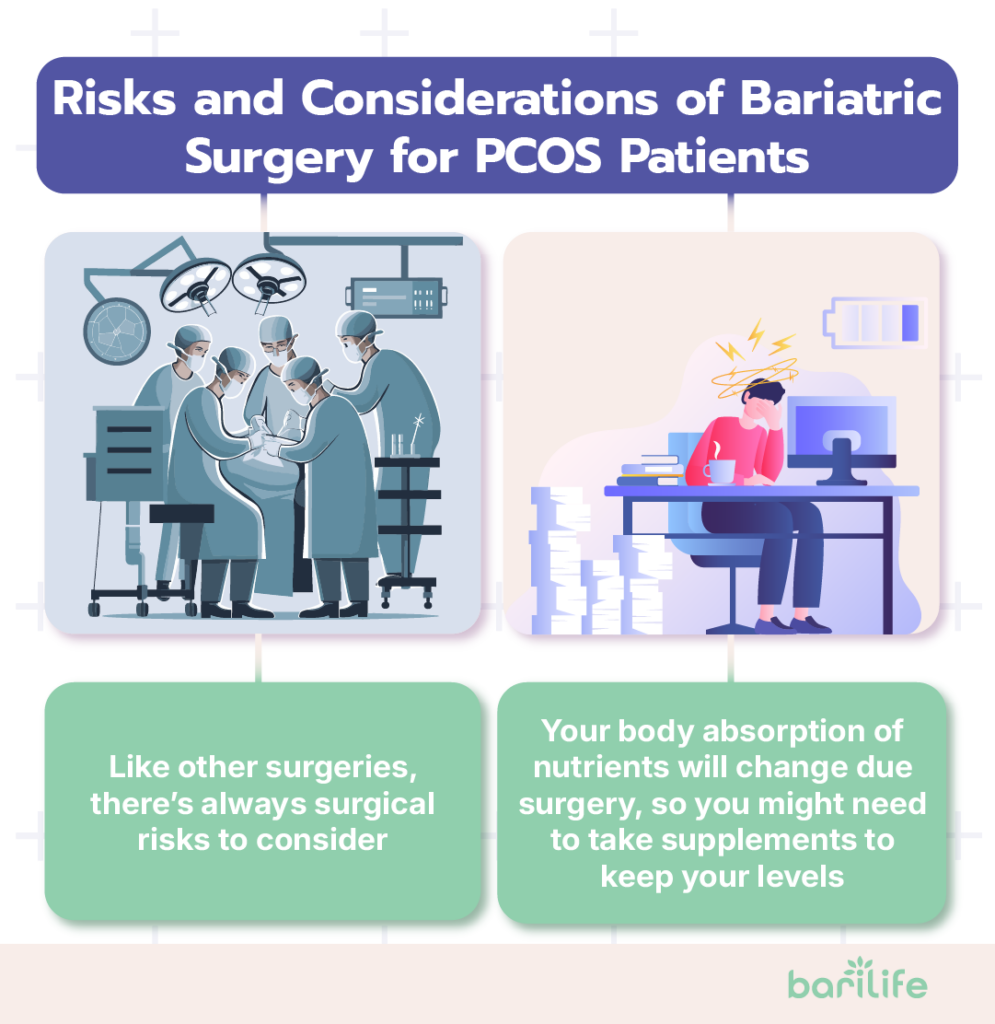
- You may need to develop new coping mechanisms if you previously used food for emotional comfort
- Depression can sometimes occur after surgery, even as physical health improves
Speaking to a mental health specialist before and after surgery can help you navigate these changes successfully.
Conclusion
The decision to go through with bariatric surgery for PCOS is deeply personal. For many females, it offers a path to significant relief from symptoms and a better quality of life when other methods have failed.
If you’re struggling with both PCOS and obesity, consider discussing bariatric surgery with your healthcare provider. They can help you understand if you’re a good candidate and which approach might work best for your situation.
How Bari Life Can Help
Nutritional support is especially crucial for women with PCOS who undergo bariatric surgery. Managing hormonal balance and metabolic health post-surgery requires a strategic approach to supplementation and diet. That’s where Bari Life comes in.
Bari Life’s complete bariatric vitamin formulations provide the essential nutrients needed to support hormone balance and metabolic health. Whether you’re looking for bariatric multivitamins, bariatric vitamins chewable, or a bariatric multivitamin with iron, our products are tailored to meet the unique needs of post-surgery individuals.
In addition to essential vitamins, Bari Life offers a wide range of bariatric protein shakes and bariatric protein bars, making it easier to maintain protein intake and manage cravings. These options, alongside our delicious bariatric snacks, can help you stay on track with your nutrition goals without compromising taste or convenience.
We also understand the importance of targeted supplements like bariatric calcium chews to support bone health and bariatric vitamins for hair loss, which can help address common post-surgical concerns. For those who prefer alternative formats, we offer liquid bariatric vitamin options that are easy to absorb.
Gut health is another crucial component of post-operative wellness, and our bariatric probiotic is specifically designed to help maintain a healthy digestive system.
Visit Bari Life today to discover how our specialized bariatric vitamins and nutritional products can support your journey to managing both your weight and PCOS symptoms effectively.
If you want to learn more, why not check out these articles below:
Resources
Diabetes and Polycystic Ovary Syndrome (PCOS). (2024). Centers For Disease Control and Prevention.
Levy, S., et al. (2024). Metabolic and Bariatric Surgery. Merk Manual.

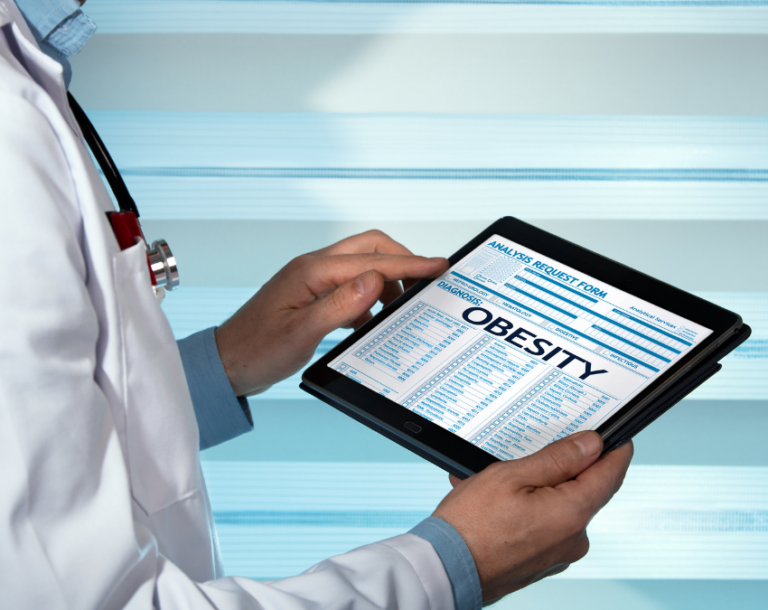

What are your tips and tricks to post-bariatric success?